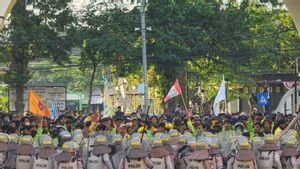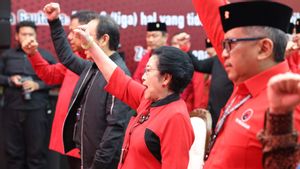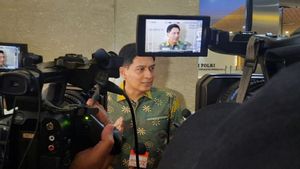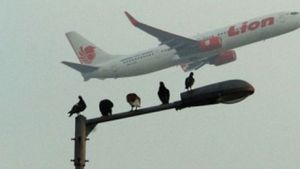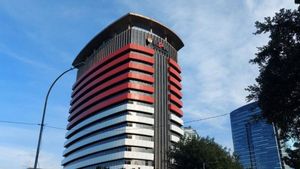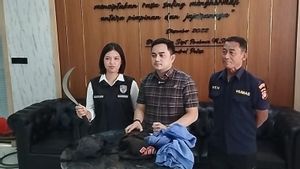JAKARTA In the middle of last week, almost all cities in Indonesia were marked by public demonstrations against the revision of the Regional Head Election Law aka the Regional Head Election Law. The reason is that the DPR is reluctant to comply with the Constitutional Court Decision No. 60 and 70 which alleviates the conditions for nominating regional head candidates.
Speaking of the Pilkada Law, Indonesia has actually implemented several mechanisms for filling regional head positions, before adopting the direct regional head election system as it is today.
Retno Saraswati, in her article in the journal Legal Problems entitled Individual Candidates: Shifting Paradigms of Power in the 2011 Election, mentions four regional head election systems that were used in Indonesia before direct elections.
First, the appointment system or appointment by the center. This mechanism has been used since the Dutch East Indies Colonial Government, Japan, and the early period after independence. After independence, the government used this mechanism based on Law 1/1945, Law 22/1948, and Law 1/1957.
SEE ALSO:
Second, the appointment mechanism used is based on the Presidential Determination 6/1959 in conjunction with Presidential Determination 5/1960, Law 6/1956, and Law 18/1956, or known as the era of Presidential Decree. In addition, this mechanism is also enforced based on the Presidential Determination 6/1959 in conjunction with Presidential Determination 5/1960 accompanied by reasons forced situation.
Third, the mechanism for selecting representatives which is the embodiment of Law 5/1974. With this mechanism, regional head elections are carried out by the DPRD, which then the president will determine the elected regional head candidates.
Fourth, a purely representative election mechanism, applied under Law 18/1965 and Law 22/1999. Called purely representative elections because the regional head was elected by the DPRD without central government intervention.
After Law 22/1999, Law no. 32 of 2004 concerning Regional Government was born. This law provides a very big change, namely Regional Heads and Deputy Regional Heads elected directly by the people in the area concerned ( ARTICLE 24 paragraph 5). Law no. 32 of 2004 is a milestone, because the first time Regional Heads and Deputy Regional Heads were directly elected by the people.
Law 22/2014 Returns Pilkada Directly To DPRD
Ten years after the implementation of Law no. 32 of 2004, Law no. 22 of 2014 concerning the Election of Governors, Regents, and Mayors. This law can be said to be a correction to Law no. 32 of 2004 which makes the public euphoric over the direct election of regional heads and deputy regional heads elected by the people. Law no. 22 of 2014 gives the authority to return to the DPRD to elect Regional Heads and their representatives as stipulated in article 28 paragraph (1) that voting, vote calculations, and voting results in the election are held in the plenary meeting of the Provincial DPRD and Regency/City DPRD.
Law no. 22 of 2014 itself was ratified towards the end of President Susilo Bambang Yudhoyono's term of office. During the discussion, the proposal to change the pilkada mechanism was immediately represented again through the DPRD made by the Red and White Coalition (KMP) which in the 2014 presidential election supported the pair Prabowo Subianto and Hatta Radjasa.
Former member of the Working Committee for the Pilkada Bill, Abdul Malik Haramain, said that after the 2014 presidential election, the majority of political parties who joined the KMP changed their attitude regarding the regional head election mechanism. The Gerindra Party, Golkar Party, Democratic Party, National Mandate Party, and the United Development Party are said to want regional heads to be elected by the DPRD. "After the presidential election, maybe because the political constellation has changed and so on, suddenly they want to be elected by the DPRD," he said, Monday, August 26, 2024.
According to Malik, only one political party of KMP members has not changed their attitude, namely PKS which remains to its original desire for direct regional head elections. This desire is similar to the coalition supporting Joko Widodo-Jusuf Kalla, namely the PDI-P, the Hanura Party, and the National Awakening Party.
"Obviously I don't understand why I changed my attitude. I think the results of the presidential election also affected KMP. Maybe they want to strengthen and continue their coalition in the national to regional areas," he added.
In the discussion of the Pilkada Bill at that time, Malik continued, there were three options for the regional head election mechanism that arose. First, the pairs of governors, mayors, and regents were directly overtaken which were supported by PDIP, PKS, HANURA, PKB and the Government. Second, the pairs of governors, mayors, and regents were chosen by the DPRD supported by Democrats, Golkar, PAN, PPP, and Gerindra. Third, the governor was chosen directly, but the regent and mayor were chosen by the DPD.
Deputy Chairman of Commission II of the DPR RI for the 2009-2014 period from the Democratic Party faction, Khatibul Umam Wiranu, revealed that his party did agree to the option of the regional head being elected by the DPRD. The reason is that apart from saving costs, the regional head chosen by the kicket is seen to be often inconsistent.
"The Democratic Party supports the election of governors, regents, and mayors to be elected by the DPRD as a representation of the voices of the people. The DPRD as the directly elected representative can channel the aspirations of the community about who the expected leader is," he said.
He quoted the 1945 Constitution Article 18 paragraph (4) which reads, Governor, regent, and mayor respectively as heads of provincial, district and city governments are democratically elected' as legal basis for approving the option. The reason is, in that article there is no sentence stating that the regional elections must be carried out directly, but elected democratically. That way, either direct or indirect, it is a technical issue that does not reduce the meaning of the democratism itself," added Umam.
Moreover, he said, in the practice of holding direct regional elections so far, almost no regional elections have given rise to problems, ranging from social tensions, riots, to the Constitutional Court. Almost all stages give birth to tensions and vulnerabilities, both social and political. Not to mention, the practice of money politics which reduces moral values in society.
The ratification of Law no. 22 of 2014 also immediately sparked protests from the public. Various elements of civil society to students held massive demonstrations either directly or through various social media to reject Law no. 22 of 2014. The massive rejection finally paid off.
On October 2, 2014, President Susilo Bambang Yudhoyono issued two Government Regulations in Lieu of Law (Perppu) at once. First, SBY signed Perppu Number 1 of 2014 concerning the Election of Governors, Regents, and Mayors. This Perppu also revokes Law No. 22 of 2014 concerning the Election of Governors, Regents, and Mayors which regulates that regional heads are elected by the DPRD.
As a consequence of the issuance of Perppu Number 1 of 2014 and to provide legal certainty, SBY issued Perppu Number 2 of 2014 concerning Amendments to Law Number 23 of 2014 concerning Regional Government. The essence of the Perppu is to abolish the duties and authorities of the DPRD to elect regional heads.
Perppu No. 1 of 2014 was finally ratified into Law no. 1 of 2015 concerning Stipulation of Government Regulations in Lieu of Law no. 1 of 2014 concerning the election of Governors, Regents, and Mayors into Laws.
Constitutional Court Decision No. 60 and 70 of 2024 Changing Conditions in Law 10/2016
Law no. 1 of 2015 is returning the election of Regional Heads and their representatives were directly elected by the people. In accordance with the dynamics of political developments, Law 1/2015 has experienced four updates. The first update is through Law 8/2015 concerning Amendments to Law 1/2015. The second update occurred through Law 10/2016 concerning the Second Amendment to Law 1/2015.
The third update was made through Perppu 2/2020 concerning the Third Amendment to Law 1/2015. Perppu 2/2020 was signed by President Joko Widodo on May 4, 2020. This legal product regulates the need to postpone the implementation of simultaneous regional elections in the midst of a pandemic. The fourth change occurred through Law 6/2020 concerning the Determination of Perppu 2/2020 into Law.
Thus, Law 6/2020 is the latest rule as the basis for holding simultaneous regional elections in the midst of the Covid-19 pandemic. This law was signed by President Joko Widodo on August 11, 2020 without changing the terms of the nomination of regional heads as stated in Law 10/2016. The technical stages and implementation of regional elections in the midst of the next pandemic are outlined in the KPU regulations.
Initially, the 2020 Simultaneous Pilkada will be held on September 23, 2020. Unfortunately, because the Covid-19 pandemic has not subsided, the regional elections will be held on December 9, 2020. The 2020 Simultaneous Pilkada will be held in 270 regions, with details of 9 provinces, 224 districts, and 37 cities.
Now, ahead of the 2024 Simultaneous Pilkada, the rules in the Pilkada Law have again changed. The reason is none other than the Constitutional Court Decision No. 60/PUU-XXII/2024 which amended Article 40 paragraph (3) of Law no. 10 of 2016 concerning the Second Amendment to Law no. 1 of 2015 concerning Stipulation of Government Regulation in Lieu of Law Number 1 of 2014 concerning the Election of Governor, Regent, and Mayor, and Decision No. 70/PUU-XXII/2024 which tested Article 7 paragraph (2) letter e of Law no. 10 of 2016.
It was ignored by the DPR who was reluctant to accommodate the Constitutional Court's decision at the Legislative Body meeting, Wednesday, August 21, the wave of protests conducted in the DPR and the Constitutional Court, Thursday, August 22, finally forced the DPR to cancel the ratification of the revision of the Pilkada Law. Sunday, August 25, the KPU, the DPR and the government ratified the PKPU Regulation which accommodates the Constitutional Court's Decision as the basis for the Simultaneous Pilkada implementation, November 2024.
The English, Chinese, Japanese, Arabic, and French versions are automatically generated by the AI. So there may still be inaccuracies in translating, please always see Indonesian as our main language. (system supported by DigitalSiber.id)



